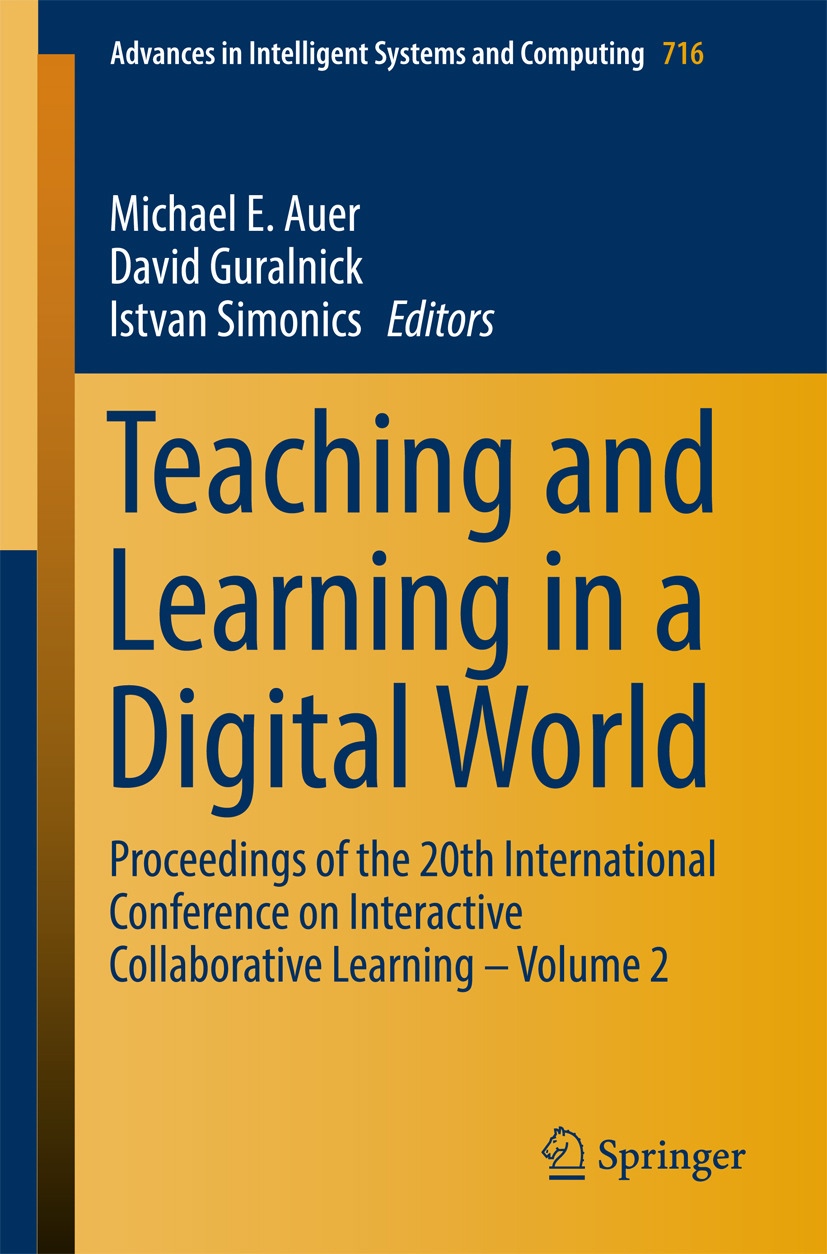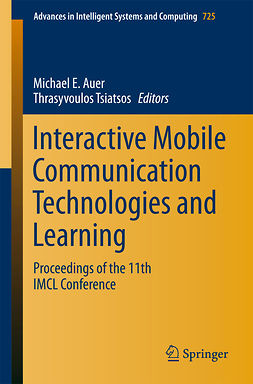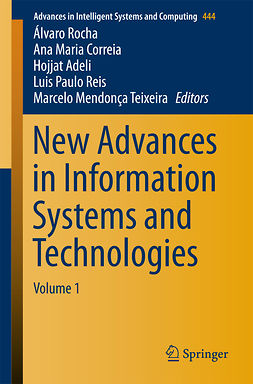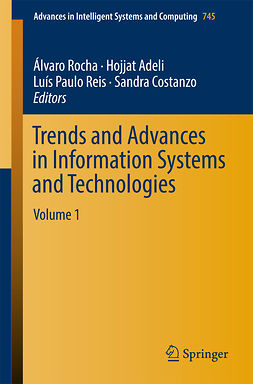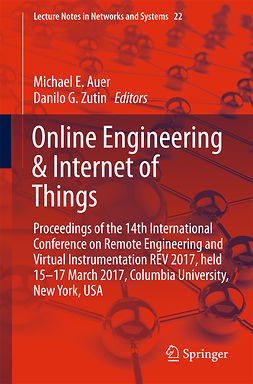Auer, Michael E.
Teaching and Learning in a Digital World
1. The Use of Software to Create E-Learning Courses on Technical Subjects at University
Leonid Leonidovich Khoroshko, Peter Alexandrovich Ukhov, Alexey Leonidovich Khoroshko
2. The Digital University Agreen U How to Build an Innovative Knowledge Sharing and Learning Project in Agribiosciences? Case Study
Caroline Martin, Camille Hervé, Philippe Prévost
3. Software Tools for Creating and Presenting Virtual 3D Models
Peter Kuna, Tomáš Kozík, Silvia Kunová, Miroslav Šebo
4. Teaching Design Project in Introductory Engineering Course Using 3D Modeling and Immersive Virtual Reality
Osama Halabi, M. Samir Abou El-Seoud, Vladimir Geroimenko
5. Low Cost Industrial Interface Design and Graphical Programming for Arduino
Carina Carla Aparecida Felipe Silva, Alan Kardek Rêgo Segundo, Vinícius Nunes Lage
6. Conceptualising Design of Learning Management Systems to Address Institutional Realities
Gerald Gwamba, Godfrey Mayende, Ghislain Maurice Norbert Isabwe, Paul Birevu Muyinda
7. Feasibility Study of Virtual Collaboration Concept of Academic Institutions from the Point of View of Students
Monika Dávideková, Michal Greguš ml., Eleonóra Beňová
8. Teaching Aviation Engineering with Remote Access to Physical Systems
Vladimír Gašpar, Rudolf Andoga, Ladislav Főző
9. Introduction and Implementation of a Multi-leveled E-learning Environment Based on the Open Content Development Model Principles
David Sik
10. The Correlation Between Concepts of Resilience and Remote Experiment in Education
Cornel Samoila, Doru Ursutiu, Vlad Jinga
11. Benefits of Using Remote Labs in Intelligent Control Teaching
Alberto Cardoso, Paulo Gil, Diana Urbano, Luís Brito Palma
12. Elements of Gamification in Virtual Learning Environments
Marcos Mincov Tenório, Francisco Antonio Fernandes Reinaldo, Lourival Aparecido Góis, Rui Pedro Lopes, Guataçara Santos Junior
13. Heuristics Discovered from Prototyping an Interactive System
Amando Pimentel Singun
14. Plagiarism Detection in SQL Student Assignments
Nikolai Scerbakov, Alexander Schukin, Oleg Sabinin
15. Quantitative Evaluation of University Lecturing
Frank Kappe, Nikolai Scerbakov
16. School Development by Evaluation
Monika Grasser, Florian Mayer, Silke Bergmoser
17. Impact of Motivation, Gamification and Learning Style on Students’ Interest in Maths Classes – A Study in 11 High School Grade
Maya Stoyanova, Daniela Tuparova, Kostadin Samardzhiev
18. Using Formal Concept Analysis in the Evaluation Process
Attila Körei
19. Improving the Quality of Engineering Education by Developing the System of Increasing Students’ Motivation
Irina Makarova, Ksenia Shubenkova, Danila Tikhonov, Polina Buyvol
20. Data Processing, Systematic Errors, and Validity of Conclusions in Education Research
George S. Ioannidis
21. Data-Mining Possibilities in Blended Learning
Gabriella Baksa-Haskó, Brigitta Baranyai
22. Follow-up on Rubric-Based Assessment of Student Outcomes by Senior-Year Graduation Design Project and Continuing to Improve by Performance Indicator Breakdown-Based Assessment
Ebru Dulekgurgen, Cigdem Yangin-Gomec, Özlem Karahan Özgün, Basak Aydin, Huseyin Guven
23. Evaluation of International Master Thesis in the Program “Entrepreneurs for Tomorrow”
Julia Lopukhova, Elena Makeeva
24. Conceptual Modelling: Common Students’ Mistakes in Visual Representation
Tatiana Gavrilova, Vadim Onufriev
25. On Mind Maps Evaluation: A Case of an Automatic Grader Development
Olga Maksimenkova, Alexey Neznanov, Iuliia Papushina, Andrei Parinov
26. Training in Research on Cognitive Control Systems
Mykhailo Poliakov, Sergii Morshchavka, Oksana Lozovenko
27. Engineering Education Program Promoting the Profession
Claudio R. Brito, Melany M. Ciampi, Rosa M. Vasconcelos, Luis A. Amaral, Henrique D. Santos, Victor A. Barros
28. High Quality Engineering Program Achievement
Melany M. Ciampi, Claudio R. Brito, Rosa M. Vasconcelos, Luis A. Amaral, Henrique D. Santos, Victor A. Barros
29. Academic Performance Assessment Based on Accumulative Rating System at Polytechnic University
Elena B. Gulk, Pavel M. Kasyanik, Konstantin P. Zakharov, Marina V. Olennikova, Denis A. Nazarov
30. Knowledge Management and Learning in Urban Revitalization Processes of Selected Non-profit Cultural Organizations in Slovakia
Maria Olejarova
31. Data Visualization and Enhanced Learning in Engineering Education Through Oil Pollution Studies and Environmental Impact Assessment
James Uhomoibhi, Conor White
32. Universities Should also Learn
Jozef Hvorecký, Emil Višňovský
33. Quantitative and Qualitative Evaluation in Collaborative Learning
Patricia Amores Guevara, Susana Arias Tapia, Javier Sánchez Guerrero, Medardo Mera Constante, José Vega Pérez, Corina Núñez Hernández, María Vargas Ramos
34. Traditions and Experience in Studying Metric Intellect in Students
Marina V. Olennikova, Pavel M. Kasyanik, Elena B. Gulk, Konstantin P. Zakharov, Viktor N. Kruglikov
35. Factors and Barriers of Inbound International Student Mobility in Russia
Julia Ziyatdinova, Petr Osipov, Anna Gornovskaya, Natalia Zolotareva
36. Female Participation in Engineering Fields: Successes, Challenges, and Recommendations in a Non-western Context
Sara Hillman, Ghada Salama
37. Professors’ Competences Through the Perspective of STEM Students
Sofia Antera, Dragana Manasova, Sonja Mihajlov
38. Training the Achievement-Oriented Engineers for the Global Business Environment
Farida T. Shageeva, Dilyara R. Erova, Inna M. Gorordetskaya, Natalia V. Kraysman, Lilia V. Prikhodko
39. Factors Affecting Student Engagement in Online Collaborative Learning Courses
Aleksandra Lazareva
40. Teaching Software Engineering in a Multicultural Environment
Simona Vasilache
41. Stress Coping Strategies in University Students
Elena V. Romanova, Pavel M. Kasyanik, Maria V. Galimzyanova
42. Continuous Assessment in Computing and Engineering Education for Improved Students’ Engagement and Enhanced Learning
James Uhomoibhi, Margaret Ross
43. Curricula Design of Teacher Training in the Area of Didactic Technological Competences
Ján Záhorec, Alena Hašková, Michal Munk
44. OntoCIP - An Ontology of Comprehensive Integrative Puzzle Assessment Method Suitable for Automatic Question Generation
Maja Radovic, Milorad Tosic, Danijela Milosevic, Dragan Jankovic
45. Mobile Applications for the Prediction of Learning Outcomes for Learning Strategies and Learning Achievement in Lifelong Learning
Pratya Nuankaew, Wongpanya Nuankaew, Kanakarn Phanniphong, Sittichai Bussaman
46. Evidence of Learning Progress in Project-Based Learning on a Study Abroad Program
Avinda Weerakoon, Nathan Dunbar
47. International Informatic Challenge in Hungary
Zsuzsa Pluhár, Barnabás Gellér
48. Self-evaluation of Pedagogical Competencies of Academic Staff in the Context of Career Management
Tiia Rüütmann, Merle Lõhmus, Raivo Sell, Ija Stõun, Mare Pihel
49. Learning to Program with Lego Mindstorms – Difference Between K-12 Students and Adults
Kadri Umbleja
50. Work-in-Progress: Classroom-Based Experiential Education
Barbara Kerr
51. Engineering Pedagogy Terminology
Tatiana Y. Polyakova, Viacheslav M. Prikhodko, Andrey N. Rementsov, Elizaveta A. Bogacheva
52. On-line Testing of Engineering Students as a Form of Assessment when Studying English in Distant Form
Elena Y. Semushina, Julia N. Ziyatdinova
53. Engineering Students’ Needs in Foreign Language Studying in Russia
Tatiana Y. Polyakova, Dina G. Karelova
54. Wither Textbooks in Language Teaching? A Closer Look at Teaching German as a Foreign Language in Sri Lanka in the Digital Age
Neelakshi Chandrasena Premawardhena
55. Study and Development of a Classroom Management System - Application for Programming Language Labs
Lamia Mezai, Omar Bousbia Brahim, Abdallah Benhamouda
56. Work-in-Progress: Needs and Training in Microelectronics Courses in the MicroElectronics Cloud Alliance
Rosario Gil Ortego, Manuel Alonso Castro Gil, María José Albert Gómez, Isabel Ortega Sánchez, María García Pérez, Slavka Tzanova
57. A Proposed Lightweight Cloud Security Framework to Secure Communications Between Internet of Things Devices
Islam A. T. F. Taj-Eddin, M. Samir Abou El-Seoud, Hosam Elsofany
58. Comparable and Analytical Study Between Some Security Issues in Cloud Computing
M. Samir Abou El-Seoud, Hosam F. El-Sofany, Islam A. T. F. Taj-Eddin
59. Designing and Delivering a Curriculum for Data Science Education Across Europe
Alexander Mikroyannidis, John Domingue, Christopher Phethean, Gareth Beeston, Elena Simperl
60. BBVPhone: Video Digital Learning for Handicraft
Riyan Rizkyandy, Risald, Suyoto
61. Using Fault Injection for Programming Task Generation
Baso Habibi, Tsuneo Nakanishi, Kenji Hisazumi, Hiroki Furusho, Akira Fukuda
62. A Mixed-Reality Environment for Personalised and Collaborative Learning in Science and Engineering
Clement Onime, James Uhomoibhi, Hui Wang
63. Interactive Games as Educative Strategy to Motivate Students to Communicate Inside the Classroom
Lida Solano, Eva Ulehlova, Verónica Espinoza
64. Communicative Style: Act Like a Pro
Christina Merl
65. Work-in-Progress: A Smart Scheduling System for Shared Interactive Remote Laboratories
Mohammed Moussa, Abdelhalim Benachenhou, Abderrahmane Adda Benatia
66. IoT Teaching with Pocket Labs
Vladimir Miodrag Cvjetkovic
67. An Activity Tracking Infrastructure forEmbedded Open Educational Labs Supporting the Needs of Lab Owners and Students
Wissam Halimi, Christophe Salzmann, Denis Gillet
68. Development and Use of a Virtual Laboratory of Measuring Devices
Alexander Afanasyev, Nikolay Voit, Dmitry Kanev, Tatyana Afanasyeva
69. 20 Years of Co-creation Using Case Based Learning
Albert Albers, Nikola Bursac, Jonas Heimicke, Benjamin Walter, Nicolas Reiß
70. Self-testing System Application to Remote Laboratory NetLab
Thomas Jonathan Zawko, Andrew Nafalski, Zorica Nedic, Hugh Considine
71. Design and Implementation of a Low-Cost and Modular Remote Lab Framework: Application to Electronic Sensors
Abdallah Benhamouda, Badreddine Benmounah, Nada Baira, Sabrina Kahmous
72. Experiences with the Use of Pocket Labs inEngineering Education
Thomas Klinger, Christian Kreiter
73. Work in Progress: Pocket Labs in IoT Education
Christian Madritsch, Thomas Klinger
74. Entrepreneurship in the Dual Engineering Training Curricula
Monika Pogatsnik
75. Serious Games for Reading Acquisition: A Tentative Prototype
Ana Sucena, João Falcão Carneiro, M. Teresa Restivo
76. Effectiveness of Traditional Laboratory Classes to Learn Basic Concepts of Electric Circuits: A Case Study
Diana Urbano
77. Friend or Foe?
Teresa L. Larkin, Benjamin R. Hein
78. Enhancing a Shared-Access, Hardware-Based, Random Number Generation System
James Wolfer
79. Comprehensive Course in Power Electronics and Its Impact on Learning Outcomes
Meena Parathodiyil
80. The Development of ICT Tools for E-Inclusion Qualities
Dena Hussain
81. Common Misunderstandings and Challenges in Learning Gauss’s Law in a Junior Level Electromagnetic Engineering Course
Jennifer Anne Byford, Premjeet Chahal
82. Aligning Training of Teachers of Technical Institutions with Outcome Based Education
Urmila Kar, Priti Das
83. Substantiating Standards for Training PhDs in Technical Universities of Ukraine (Case Study of the National Mining University, Dnipro, Ukraine)
Yuliia Shabanova
84. Involving Students in Research with Elements of Game-Based Learning for Engineering Education
Petr Bychkov, Maria Netesova, Anna Sachkova, Carlo Mapelli, Irina Zabrodina
85. The Issues of Teaching English and German for Specific Purposes to the Academic Staff of a Technical University
Elena Zakharova, Anna Bogdanova, Maria Netesova
86. Professional Technical Teacher Education at CTU in Prague
Pavel Andres, Petr Svoboda
Keywords: Engineering, Computational Intelligence, Artificial Intelligence (incl. Robotics)
- Editor
- Auer, Michael E.
- Guralnick, David
- Simonics, Istvan
- Publisher
- Springer
- Publication year
- 2018
- Language
- en
- Edition
- 1
- Series
- Advances in Intelligent Systems and Computing
- Page amount
- 18 pages
- Category
- Technology, Energy, Traffic
- Format
- Ebook
- eISBN (PDF)
- 9783319732046
- Printed ISBN
- 978-3-319-73203-9

